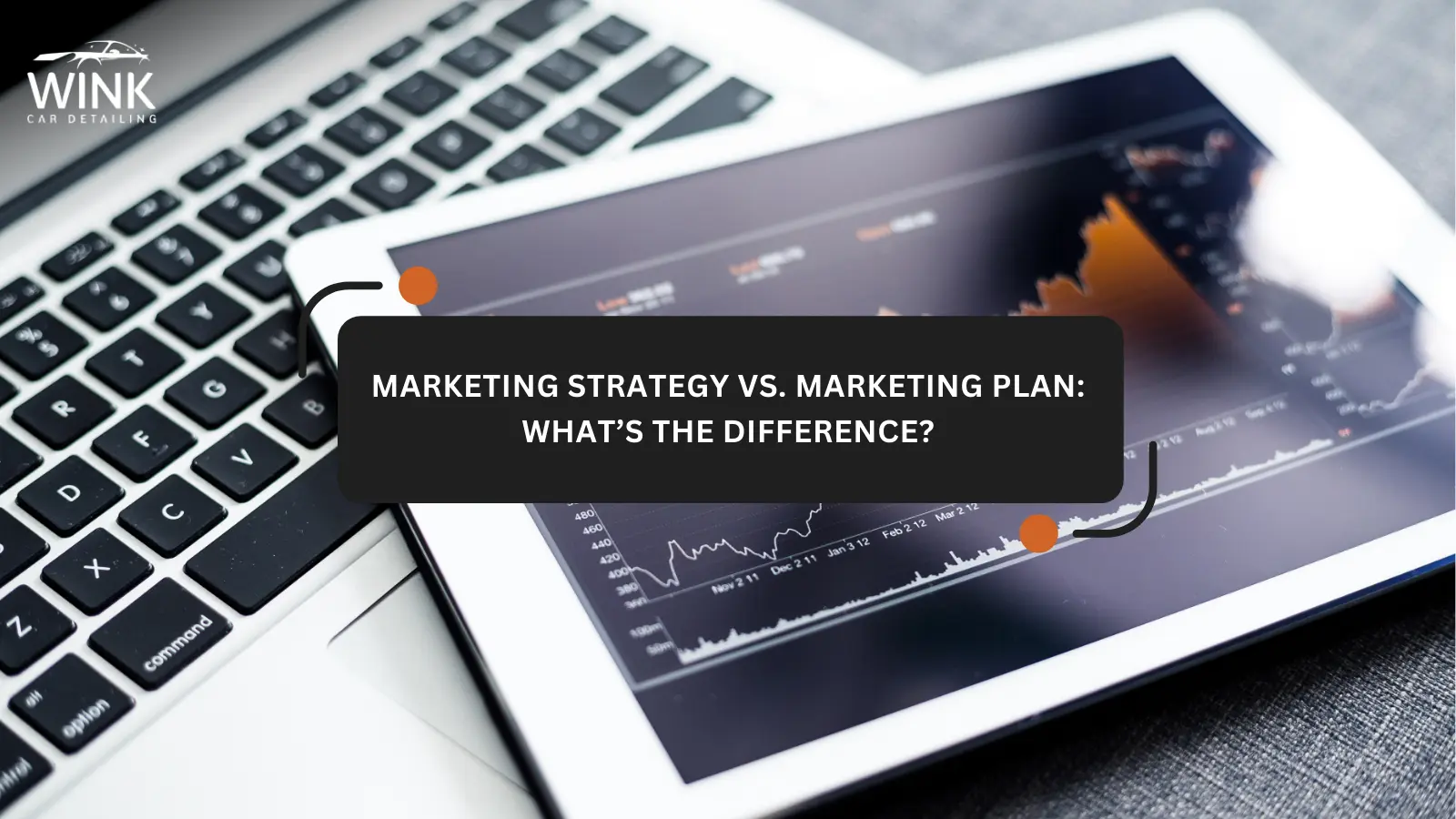Marketing Strategy vs. Marketing Plan: What’s the Difference?
At first glance, marketing strategy and marketing plan might appear to be similar, and it’s easy to see why. Just as a business strategy fits into a larger business plan, marketing strategies often fit within a broader marketing plan. However, while marketing strategies are part of marketing plans, marketing plans are not necessarily part of strategies. Confusing? Don’t worry! Let’s break it down using a simple example to clearly explain the difference.
What is a Marketing Strategy?
A marketing strategy is the “what” and the “why” of your marketing efforts. It is your long term vision for how you plan to achieve specific business goals through marketing. A strategy focuses on the bigger picture and sets the direction for all your marketing activities.
A Simple Example of a Marketing Strategy
Imagine you are preparing to launch your own business, maybe a car detailing service or a business consultancy next spring. One of your core marketing strategies might be to launch a business website to attract and inform potential customers.
- Your business goal: To start and grow your business.
- Your marketing strategy: To position and promote your brand online through a professional website.
The strategy gives you a broad direction: launching the website to promote your services. However, the strategy itself doesn’t provide specific steps or details on how you will build that website. It only focuses on what you need to achieve and why it matters.
What is a Marketing Plan?
While a strategy answers the “what” and “why,” a marketing plan deals with the “how.” Your marketing plan is the detailed roadmap that explains how you will implement your marketing strategies. It includes the steps, processes, and resources needed to bring the strategy to life.
What Your Marketing Plan Includes
Going back to our example of launching a website, your marketing plan will contain all the specific actions, timelines, and resources required to develop the website.
For instance, your marketing plan would outline details like:
Resources Needed:
- What tools, software, or budgets are required?
- Do you need website builders, graphic designers, or content writers?
Who Will Be Responsible:
- Who will handle each task?
- Will you hire a freelance developer or use an in-house team?
Project Breakdown:
- The various sub-tasks needed to complete the website.
- Example: Graphic design, content writing, SEO setup, website testing, and launch.
Timelines and Deliverables:
- When will each part of the website be completed?
- What are the deadlines for final review and launch?
Oversight and Accountability:
- Who is overseeing the entire project?
- What happens if tasks fall behind schedule?
Key Differences Between a Marketing Strategy and a Marketing Plan
Let’s clarify the differences between these two concepts:
A Marketing Strategy is the Vision:
- It sets the direction and focuses on achieving long term business goals.
- Example: “Launch a professional website to promote our car detailing services.”
A Marketing Plan is the Action Guide:
- It explains how to execute the strategy step by step.
- Example: Break the website project into smaller tasks, assign responsibilities, and set deadlines.
Scope and Detail:
- A marketing strategy is high level and focuses on the big picture.
- A marketing plan is detailed and practical, explaining who, what, when, and how.
Think of it this way: If your marketing strategy is the destination on a map, your marketing plan is the step-by-step directions to get there.
How Strategies and Plans Work Together
Your marketing strategies and marketing plans are interconnected. You can’t have a marketing plan without a strategy to guide it. At the same time, marketing strategies only make sense if there’s a plan in place to bring them to life.
Here’s a quick summary:
- Marketing Strategy: Sets goals and outlines what needs to happen to achieve them.
- Marketing Plan: Provides the specific steps, tools, and resources to make the strategy work.
Practical Examples of Strategies and Plans
Example 1: Launching a New Car detailing Service
Marketing Strategy:
- Promote the car detailing service through SMS campaigns and a customer rewards program to encourage repeat visits.
Marketing Plan:
SMS Campaign:
- Collect customer phone numbers.
- Write promotional messages for discounts and car detailing packages.
- Schedule weekly SMS campaigns using a marketing platform.
Customer Rewards Program:
- Create a rewards system where customers earn credits for every car detailing.
- Partner with a local software provider to track points.
- Offer rewards like free parking, discounted services, or special gifts.
Example 2: Promoting a New Business Consultancy
Marketing Strategy:
- Build authority and visibility by sharing valuable content through blogs and social media.
Marketing Plan:
Content Development:
- Hire a writer to produce two blog posts per week.
- Focus topics on business tips and success stories.
Social Media Promotion:
- Share the blog posts on LinkedIn, Facebook, and Twitter.
- Use targeted ads to boost visibility among business owners.
Timeline:
- Start content production in Week 1.
- Launch the first social media promotion by Week 2.
Why Both Are Important
Understanding the difference between marketing strategy and marketing plan is crucial for business success. Without a strategy, you won’t know your goals or what direction to take. Without a plan, you won’t know how to achieve those goals effectively.
When done right, your strategy gives you focus, while your plan gives you clarity and action. Together, they help you:
- Maximize resources and time.
- Stay organized and accountable.
- Track progress and adjust as needed.
Bringing It All Together
To summarize, a marketing strategy is your high level game plan for achieving business goals. It identifies the direction and purpose of your marketing activities. A marketing plan, on the other hand, is a step by step guide that breaks down how you will execute that strategy.
For example:
- Marketing Strategy: Launch a customer rewards program to increase repeat visits.
- Marketing Plan: Outline specific steps like setting up the program, promoting it to customers, and tracking performance.
By aligning your marketing strategies and plans, you ensure that every action you take has a clear purpose and measurable results.
Final Thoughts
To grow a successful business, you need both a strong marketing strategy and a defined marketing plan. One cannot work effectively without the other.
- Start with a clear strategy that sets your goals and direction.
- Then, build a detailed plan that outlines how to achieve those goals.
Whether you’re launching a new website, starting a rewards program, or running ads, remember that every effort should align with your strategy and be supported by a practical plan. This combination will help you drive results, stay organized, and reach your business goals faster.
Ready to create a winning strategy and actionable plan for your business? Start today and set your business up for success!





